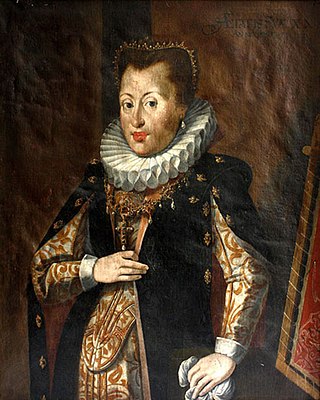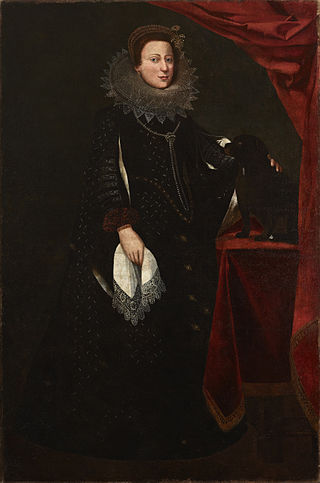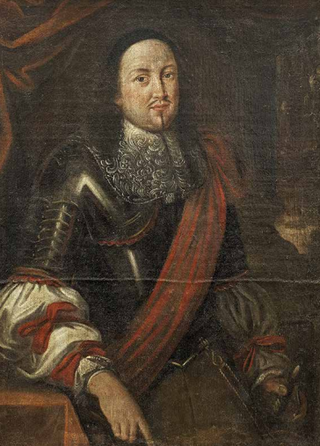Related Research Articles

James Shirley was an English dramatist.

Eleonora Gonzaga, was born a princess of Mantua as a member of the House of Gonzaga, and by marriage to Ferdinand II, Holy Roman Emperor, was Holy Roman Empress, German Queen, Queen of Hungary and Bohemia.

Louis VI of Hesse-Darmstadt was Landgrave of Hesse-Darmstadt from 1661 to 1678.

Margherita Barbara Gonzaga, was an Italian noblewoman, Duchess consort of Ferrara, Modena and Reggio between 1579 and 1597 by marriage to Alfonso II d'Este, Duke of Ferrara, Modena and Reggio. She was a significant cultural patron in Ferrara and Modena.

Anna Caterina Gonzaga, later Anna Juliana O.S.M. was an Archduchess of Austria who became a Religious Sister of the Servite Order after the death of her husband, the Archduke Ferdinand II of Austria. A cause for her canonization is open but has not advanced since the 17th century.
The Coronation is a Caroline era stage play, a tragicomedy written by James Shirley, and notable for the tug-of-war of authorship claims in which it was involved in the middle seventeenth century.
The Bird in a Cage, or The Beauties is a Caroline era comedy written by James Shirley, first published in 1633. The play is notable, even among Shirley's plays, for its lushness — what one critic has called "gay romanticism run mad."
The Brothers is a Caroline era stage play, a comedy written by James Shirley. First published in 1652, The Brothers has sometimes been hailed as one of Shirley's best plays, though it has also been a focus of significant confusion and scholarly debate.

Eleonora Gonzaga, was by birth Princess of Mantua, Nevers and Rethel from the Nevers branch of the House of Gonzaga and was Holy Roman Empress, German Queen, Queen consort of Hungary and Bohemia by marriage to Emperor Ferdinand III.
The Doubtful Heir, also known as Rosania, or Love's Victory, is a Caroline era stage play, a tragicomedy written by James Shirley and first published in 1652. The play has been described as "swift of action, exciting of episode, fertile of surprise, and genuinely poetic."
The Opportunity is a Caroline era stage play, a comedy written by James Shirley, published in 1640. The play has been called "a capital little comedy, fairly bubbling over with clever situations, and charming character."
The Humorous Courtier, also called The Duke, is a Caroline era stage play, a comedy written by James Shirley, first published in 1640.
The Court Secret is a Caroline era stage play, a tragicomedy written by James Shirley, and first published in 1653. It is generally regarded as the final play Shirley wrote as a professional dramatist.
The Politician is a Caroline era stage play, a tragedy written by James Shirley, and first published in 1655.
The Bashful Lover is a Caroline era stage play, a tragicomedy written by Philip Massinger. Dating from 1636, it is the playwright's last known extant work; it appeared four years before his death in 1640.

Anna Gonzaga was an Italian French noblewoman and salonist. The youngest daughter of Charles Gonzaga, Duke of Mantua and Montferrat, and Catherine de Mayenne, Anna was "Princess Palatine" as the wife of Edward of the Palatinate, a grandson of King James I of England and uncle to King George I of Great Britain. She bore Edward three children, all daughters. Had Anna not converted Edward to Catholicism, the English throne might have passed to their descendants.

Camilla Faà di Bruno, also da Casale, also Camilla Faà Gonzaga was an Italian noble who was married secretly, briefly and morganatically to Ferdinando the Gonzaga Duke of Mantua and Duke of Montferrat. Repudiated by her husband she became a nun and the sixteen page memoir which she wrote in 1622 at the behest of her Mother Superior has been described as the first prose autobiography written by an Italian woman. Her story was the subject of Paolo Giacometti’s historical drama Camilla Faa da Casale, first performed at the Teatro Nuovo, Florence on 29 October 1846.

Ferrante III Gonzaga, was a Duke of Guastalla.

Suzanne Henriette de Lorraine was a member of the House of Lorraine, Duchess of Mantua by marriage to Ferdinand Charles Gonzaga. Her spouse was the last Gonzaga duke of Mantua.

Ippolita Gonzaga was an Italian noblewoman and nun. She is not to be confused with her niece Ippolita Gonzaga (1535–1563) the daughter of Ferrante Gonzaga, who married in 1549 Fabrizio Colonna, hereditary prince of Paliano, and in 1554 Antonio Carafa, duke of Mondragone.
References
- Forsythe, Robert Stanley. The Relations of Shirley's Plays to the Elizabethan Drama. New York, Columbia University Press, 1914.
- Nason, Arthur Huntington. James Shirley, Dramatist: A Biographical and Critical Study. New York, 1915; reprinted New York, Benjamin Blom, 1967.